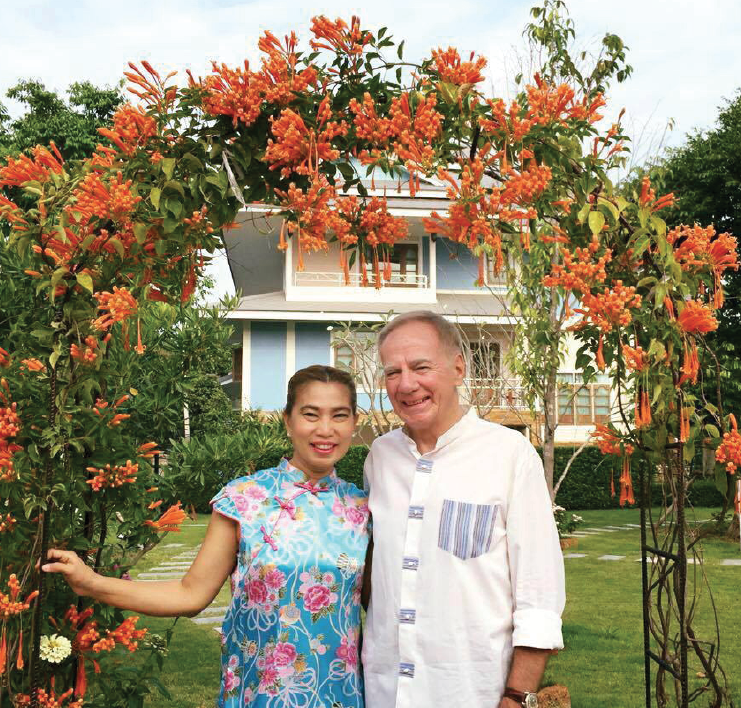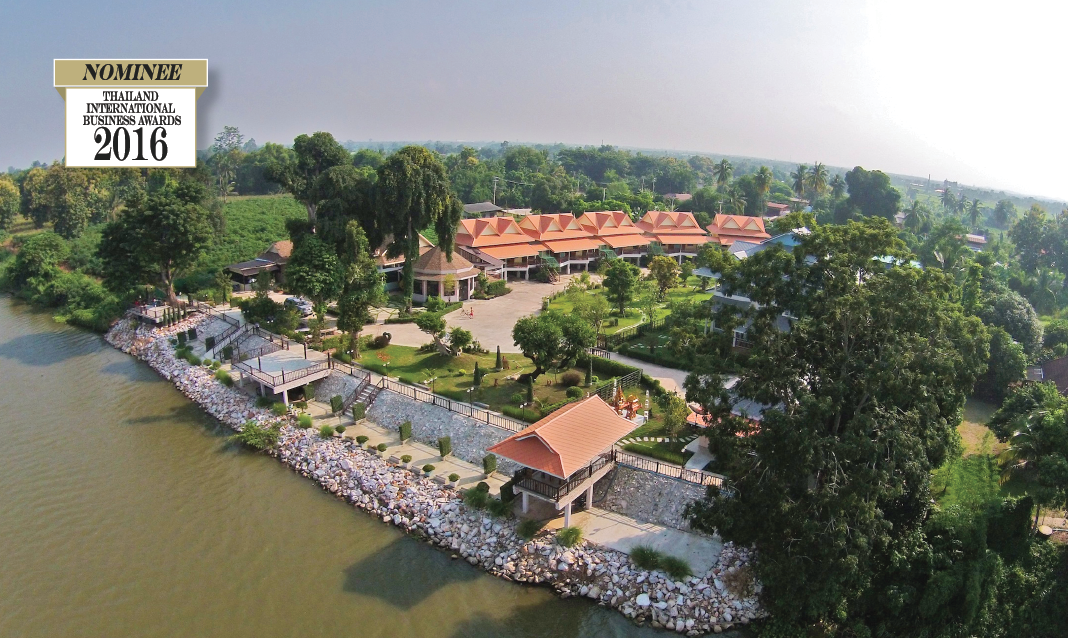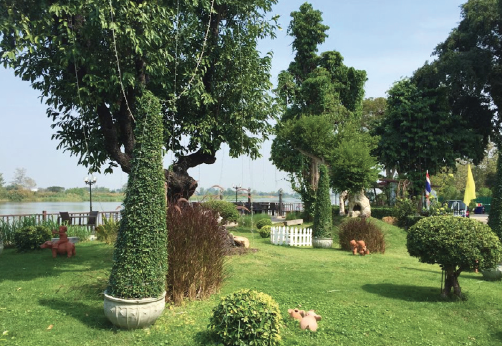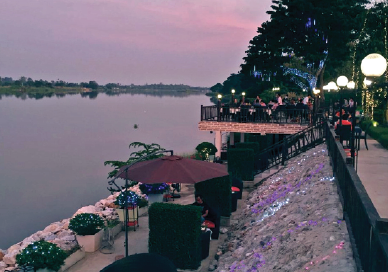| After eight years and lots of hurdles (costly mistakes, a departing construction manager, and even a plague of street-pecker pigeons among them) former Bangkok Post Managing Director David Armstrong and his wife, Nichapa, have finally opened Maeping Mango Riverside Resort in Kamphaeng Phet. And it’s lovely. IT was a little idea that grew. When my then-girlfriend Nichapa told me, eight years ago, her dream was to build and run a small restaurant by the river in her hometown of Kamphaeng Phet, it seemed to make sense. Nichapa, who is now my wife, is an excellent and innovative cook. And I was coming to the end of my full-time working career. |
It also seemed to make sense to build a home there. And a small resort, to feed customers into the restaurant.
In my mind’s eye, it would be like a Western motel with a breakfast and dinner restaurant attached, and a holiday home.
Last November we opened our restaurant and resort business: an indoor restaurant that comfortably seats 60 people and can take up to 100; an outdoor restaurant in a riverside garden that has often served more than 100; a hotel (properly registered) that has only 10 rooms but they are large and would qualify as at least 4-star; and a two-storey, four bedroom house.
It is all spread over four rai of land by the Ping River in historic Kamphaeng Phet, a town 350km north-west of Bangkok with a World Heritage listing for its ancient temples. It is one of Thailand’s little gems.
The project grew because we had a lot of time to think about it, to talk about it and to plan.
I had come to Bangkok in 2005 – after a 35-year career in newspapers and magazines in Australia and Hong Kong – to run Post Publishing, the Bangkok Post company. I had a fancy American-style title but my role was that of managing director.
That job would end in 2008 but I spent the next two years as a consultant to Post Publishing and helping a number of small publishers in Bangkok. Then I spent two years as chairman of Post Media, the Phnom Penh Post company.
That meant we did not get started on the design and building work until 2013.
We had bought the land in 2008. It is on a gentle bend in the Ping River, which is wide and graceful as it flows through Kamphaeng Phet.
One of the features was (and is) a giant mango tree that some people think might be more than 200 years old.
The tree is a local landmark and held by many living nearby to be a special tree that houses the spirits that protect the land and those who live on it.
They would rub it with powder and try to make out numbers they would use when buying lottery tickets. They seemed to have a reasonable strike rate.
In my mind’s eye, it would be like a Western motel with a breakfast and dinner restaurant attached, and a holiday home.
Last November we opened our restaurant and resort business: an indoor restaurant that comfortably seats 60 people and can take up to 100; an outdoor restaurant in a riverside garden that has often served more than 100; a hotel (properly registered) that has only 10 rooms but they are large and would qualify as at least 4-star; and a two-storey, four bedroom house.
It is all spread over four rai of land by the Ping River in historic Kamphaeng Phet, a town 350km north-west of Bangkok with a World Heritage listing for its ancient temples. It is one of Thailand’s little gems.
The project grew because we had a lot of time to think about it, to talk about it and to plan.
I had come to Bangkok in 2005 – after a 35-year career in newspapers and magazines in Australia and Hong Kong – to run Post Publishing, the Bangkok Post company. I had a fancy American-style title but my role was that of managing director.
That job would end in 2008 but I spent the next two years as a consultant to Post Publishing and helping a number of small publishers in Bangkok. Then I spent two years as chairman of Post Media, the Phnom Penh Post company.
That meant we did not get started on the design and building work until 2013.
We had bought the land in 2008. It is on a gentle bend in the Ping River, which is wide and graceful as it flows through Kamphaeng Phet.
One of the features was (and is) a giant mango tree that some people think might be more than 200 years old.
The tree is a local landmark and held by many living nearby to be a special tree that houses the spirits that protect the land and those who live on it.
They would rub it with powder and try to make out numbers they would use when buying lottery tickets. They seemed to have a reasonable strike rate.
| The location and the tree gave us the name for the project: Maeping Mango Riverside Resort. The land is at the end of a small soi that is officially a public road but originally was just a bush track. In the wet season, a four-wheel drive vehicle got through the mud much more easily than a standard car. We sold Nichapa’s Mazda 3 and bought an Isuzu D-Max. We had the land cleared and leveled it. In the process we had to remove a number of trees to make space for building. We saved the wood and it is now used in the resort as big, natural-looking tables. In 2013 we called in a design team and gave them a brief. The inspiration for the design was architecture blending Thai and European styles, seen in Bangkok and Hua Hin in the reigns of Kings Rama V and Rama VI (100 years or so ago). The starting point for design of the resort hotel building was the aide-de-camp’s home at Maruekhathaiyawan Palace (the Hua Hin Summer Palace) built by King Rama VI in 1923. Like the palace, the house is built on stilts. Building started late in 2013. We rented a room in a small resort and Nichapa lived there much of the time so she could supervise the project. I still had things to do in Bangkok and spent about half my time in Kamphaeng Phet. |
The start of building was accompanied by a colourful ceremony to call on the spirits that dwell on the land to protect all who would live on it.
The first few months went well. The builders by and large were experienced, competent and helpful and the construction manager knew his job.
But after about nine months, he suddenly withdrew – for reasons that remain unclear to me. We also lost a few workers as we thought the former manager was responsible for paying them that month.
It was our biggest setback but Nichapa overcame it: she became full-time project manager. She could draw on her training as an accountant and experience as a logistics officer with two international IT companies. She is a very good organiser.
From the start she had been in charge of purchasing material such as floor and roof tiles and bathroom fittings and was a familiar figure in homeware stores in Bangkok, Kamphaeng Phet and nearby Nakhon Sawan. Now she bought everything: if the workers wanted a box of nails or a can of paint, she bought it.
She hired work teams, discussed the jobs with them and supervised their work. She made sure they were all paid on time.
She designed bathrooms and built-ins. She oversaw the paving of the old bush track, complete with street lighting. And she turned a bare clay field into a beautiful garden, with trees in the outdoor dining area draped in, or wrapped with, sparkling coloured lights.
My role was to discuss the ideas with Nichapa and then let her implement them. Sometimes I made helpful suggestions, such as “The garden must be beautiful” or “We should have coloured lights in the trees.”
There were glitches, of course. One concerned roof tiles. The tiles on the resort building and the house were of a style used 100 years ago and they are difficult for current-day tilers to install. Nichapa solved the problem by tracking down an expert in Kanchanaburi.
We discovered the biggest glitch when a company from Bangkok was putting in the restaurant kitchen. The electricity cable that ran across the resort to the kitchen was of a domestic specification, not commercial. That mistake cost an extra 130,000 baht.
And there was one problem I simply did not expect. Maeping Mango is on the edge of a small town halfway between Bangkok and Chiang Mai and surrounded by farmland, yet we were struck by a plague of street-pecker pigeons. A little like London.
They seem to like to roost on the tallest building around. In our neighbourhood, this is our house. They were making quite a mess on the roof.
We called in a company that ran an electric wire around the edges of the roofing, to give the birds a slight but not-so-pleasant shock when they landed.
Not thinking about the birds was an 80,000 baht oversight.
We had originally hoped to open in time for Songkran last year but as we were doing it all ourselves we decided to take everything slowly and carefully. We put off the opening until Loy Krathong – which had the extra benefit of giving the garden a full wet season to settle in and grow.
Many people ask if we came in on budget. The answer is: which budget? We had three budgets – the official one according to the quotes; an unofficial one, adjusted for where we thought the quotes were too optimistic; and a third one, where we tried to estimate costs we could not know precisely, mainly those related to outfitting the rooms and the restaurant.
We came in close to the third budget.
We opened on November 24, the day before Loy Krathong. The initial response to the restaurant was overwhelming, so much so that the kitchen could not keep up with it for the first few days.
Now it is running smoothly and the restaurant business is good. The hotel business is slower but we have not been pushing it as all the staff are focused on the restaurant.
As we came to realise, the restaurant – the original idea – was destined to be the bigger business.
My plan had been to spend half my time at Maeping Mango and half in Bangkok. Since then, I have grown eight years older and communications have become eight years better.
So I spend most of my time in Kamphaeng Phet, acting a little like a chairman to Nichapa as chief executive, to use a corporate analogy.
I have breakfast on the veranda, watching the river flow by and the sun rise over the tree tops. At night, I sit at a table in a riverside garden restaurant and eat some of the best Thai food available anywhere.
The idea that seemed to make sense in 2008 makes even more sense now.
For more info visit www.maepingmangoriverside.com
The first few months went well. The builders by and large were experienced, competent and helpful and the construction manager knew his job.
But after about nine months, he suddenly withdrew – for reasons that remain unclear to me. We also lost a few workers as we thought the former manager was responsible for paying them that month.
It was our biggest setback but Nichapa overcame it: she became full-time project manager. She could draw on her training as an accountant and experience as a logistics officer with two international IT companies. She is a very good organiser.
From the start she had been in charge of purchasing material such as floor and roof tiles and bathroom fittings and was a familiar figure in homeware stores in Bangkok, Kamphaeng Phet and nearby Nakhon Sawan. Now she bought everything: if the workers wanted a box of nails or a can of paint, she bought it.
She hired work teams, discussed the jobs with them and supervised their work. She made sure they were all paid on time.
She designed bathrooms and built-ins. She oversaw the paving of the old bush track, complete with street lighting. And she turned a bare clay field into a beautiful garden, with trees in the outdoor dining area draped in, or wrapped with, sparkling coloured lights.
My role was to discuss the ideas with Nichapa and then let her implement them. Sometimes I made helpful suggestions, such as “The garden must be beautiful” or “We should have coloured lights in the trees.”
There were glitches, of course. One concerned roof tiles. The tiles on the resort building and the house were of a style used 100 years ago and they are difficult for current-day tilers to install. Nichapa solved the problem by tracking down an expert in Kanchanaburi.
We discovered the biggest glitch when a company from Bangkok was putting in the restaurant kitchen. The electricity cable that ran across the resort to the kitchen was of a domestic specification, not commercial. That mistake cost an extra 130,000 baht.
And there was one problem I simply did not expect. Maeping Mango is on the edge of a small town halfway between Bangkok and Chiang Mai and surrounded by farmland, yet we were struck by a plague of street-pecker pigeons. A little like London.
They seem to like to roost on the tallest building around. In our neighbourhood, this is our house. They were making quite a mess on the roof.
We called in a company that ran an electric wire around the edges of the roofing, to give the birds a slight but not-so-pleasant shock when they landed.
Not thinking about the birds was an 80,000 baht oversight.
We had originally hoped to open in time for Songkran last year but as we were doing it all ourselves we decided to take everything slowly and carefully. We put off the opening until Loy Krathong – which had the extra benefit of giving the garden a full wet season to settle in and grow.
Many people ask if we came in on budget. The answer is: which budget? We had three budgets – the official one according to the quotes; an unofficial one, adjusted for where we thought the quotes were too optimistic; and a third one, where we tried to estimate costs we could not know precisely, mainly those related to outfitting the rooms and the restaurant.
We came in close to the third budget.
We opened on November 24, the day before Loy Krathong. The initial response to the restaurant was overwhelming, so much so that the kitchen could not keep up with it for the first few days.
Now it is running smoothly and the restaurant business is good. The hotel business is slower but we have not been pushing it as all the staff are focused on the restaurant.
As we came to realise, the restaurant – the original idea – was destined to be the bigger business.
My plan had been to spend half my time at Maeping Mango and half in Bangkok. Since then, I have grown eight years older and communications have become eight years better.
So I spend most of my time in Kamphaeng Phet, acting a little like a chairman to Nichapa as chief executive, to use a corporate analogy.
I have breakfast on the veranda, watching the river flow by and the sun rise over the tree tops. At night, I sit at a table in a riverside garden restaurant and eat some of the best Thai food available anywhere.
The idea that seemed to make sense in 2008 makes even more sense now.
For more info visit www.maepingmangoriverside.com






 RSS Feed
RSS Feed
















